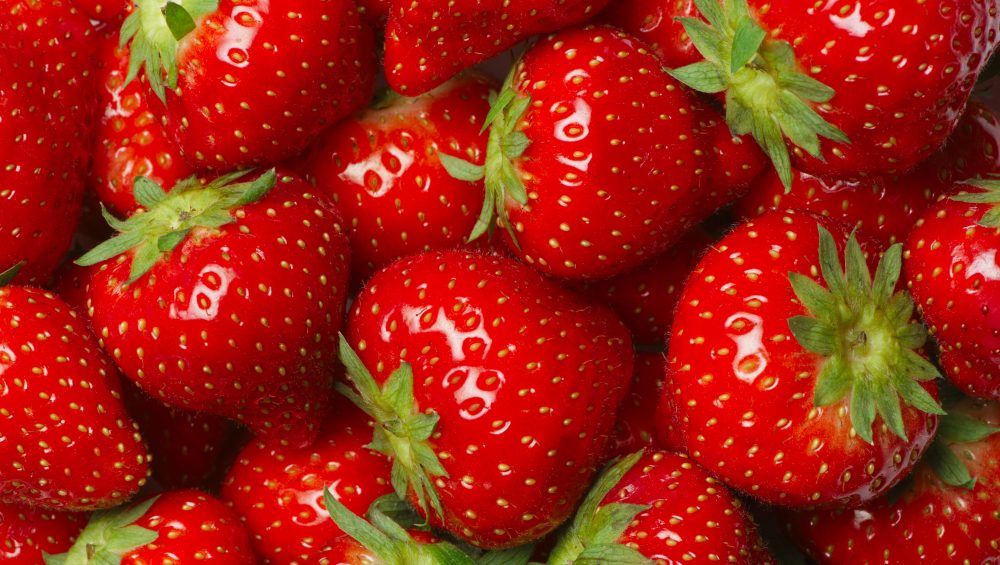Strawberries: The Sweet Taste Of Good Health
Eating a healthy diet is essential for good health, but it can be hard to get the recommended amount of fruits and vegetables in your daily routine. Finding produce that’s both nutritious and delicious can be difficult. Plus, some options may have been grown using unsustainable methods, which can negatively impact the environment. Fortunately, there’s one fruit that ticks all these boxes – strawberries!
They’re packed with vitamins and minerals, contain antioxidants that help protect against free radical damage, come in many forms, so there’s something for everyone, and you can choose organic or sustainably grown options if you want to reduce their environmental impact. So why not make strawberries part of your daily routine? Read on to find out more about how incorporating strawberries into your diet could benefit your health!

1Introduction
Strawberries are a popular fruit known for their sweet taste and bright red color. They are a part of the rose family and are native to Europe and Asia. They have been cultivated for over 2,000 years, and today, they are grown in many countries around the world. They are a versatile fruit and can be eaten fresh, frozen, or made into preserves, jams, and jellies. They are also a popular ingredient in desserts and baked goods.
Strawberries are an excellent source of vitamin C, manganese, and folate; they also contain small amounts of vitamin B6, vitamin K, and potassium. They are also low in calories, with about 50 calories per cup of sliced strawberries. They are also a great source of antioxidants, which can help protect the body against damage from free radicals. These antioxidants, along with vitamin C, may also help boost the immune system. Strawberries also contain flavonoids, which may help lower the risk of heart disease and certain types of cancer.

2Heart-Healthy Strawberries: Antioxidants And Vitamin C
Strawberries are an excellent source of antioxidants, which are compounds that help protect the body from damage caused by free radicals. These antioxidants, including vitamin C, anthocyanins, and ellagitannins, may help lower the risk of heart disease, cancer, and other chronic diseases. In addition, antioxidants also help reduce inflammation in the body, which is a risk factor for heart disease.
Vitamin C is one of the most important antioxidants found in strawberries. It has been shown to have a beneficial effect on heart health by reducing the risk of heart disease. This is because it helps lower blood pressure, improve endothelial function, and reduce inflammation. It also helps protect LDL cholesterol from oxidation, which can prevent the formation of plaques in the arteries.
Strawberries contain compounds that have been shown to have a beneficial effect on cholesterol levels. For example, they contain ellagitannins, which have been shown to lower LDL cholesterol, the “bad” cholesterol, and increase HDL cholesterol, the “good” cholesterol. Additionally, the fiber content of strawberries may also help lower cholesterol levels by binding to bile acids in the gut and promoting their excretion.

3Strawberries For Weight Loss: Low-Calorie And Anti-Inflammatory
Strawberries are a low-calorie fruit, with about 50 calories per cup of sliced strawberries, making them a great option for those looking to lose weight. They are also high in fiber, which can help keep you feeling full and satisfied, reducing the likelihood of overeating. Additionally, the high water content of strawberries may help reduce cravings and keep you hydrated.
Inflammation is a risk factor for many chronic diseases, including obesity. Strawberries are known for their anti-inflammatory properties. They contain antioxidants, such as vitamin C, anthocyanins, and ellagitannins, that have been shown to reduce inflammation in the body. This can be beneficial for weight loss, as it can help reduce the risk of chronic diseases and improve overall health.
The high antioxidant content of strawberries can also help boost metabolism, which can aid in weight loss. Antioxidants, such as vitamin C, anthocyanins, and ellagitannins, help protect the body against damage from free radicals, which can slow down the metabolism. Eating a diet high in antioxidants, like the one found in strawberries, can help speed up metabolism, leading to an increase in calorie burn and weight loss.

4Brain-Boosting Strawberries: Improving Cognitive Function
Eating strawberries may have a positive impact on brain health. Studies have shown that the antioxidants found in strawberries, including vitamin C, anthocyanins, and ellagitannins, may help protect the brain from damage and improve cognitive function. These compounds can help reduce inflammation in the brain, which is a risk factor for cognitive decline and neurodegenerative diseases such as Alzheimer’s.
The antioxidants found in strawberries, including vitamin C and anthocyanins, may also help improve memory. These compounds have been shown to have a protective effect on the hippocampus, a part of the brain that is responsible for memory formation and recall. Additionally, the high levels of vitamin C in strawberries can also help improve blood flow to the brain, which can lead to better cognitive function and memory.
Eating strawberries may also have a positive impact on mood. The antioxidants found in strawberries, including vitamin C and anthocyanins, have been shown to have a beneficial effect on mental health. These compounds have been shown to have an anti-inflammatory effect on the brain, which can lead to an improvement in mood and a reduction in symptoms of depression and anxiety. Additionally, the folate found in strawberries may also play a role in mood regulation by helping produce neurotransmitters such as serotonin and dopamine.

5Beauty From Within: Strawberries For Glowing Skin
Collagen is a protein that is vital for healthy and youthful-looking skin. It is responsible for skin elasticity, firmness, and hydration. Strawberries contain vitamin C, which is essential for collagen production. Vitamin C helps boost collagen production by assisting in the process of collagen synthesis. This can lead to an improvement in the appearance of fine lines, wrinkles, and overall skin texture.
Strawberries are also known for their ability to protect the skin from sun damage. The antioxidants found in strawberries, including vitamin C, anthocyanins, and ellagitannins, can help protect the skin from harmful UV rays. These antioxidants can help neutralize free radicals that are produced when the skin is exposed to UV rays, which can lead to sun damage and an increased risk of skin cancer.
The antioxidants found in strawberries, including vitamin C, anthocyanins, and ellagitannins, may also have an anti-aging effect on the skin. These compounds can help protect the skin from damage caused by free radicals, which can lead to an improvement in the appearance of fine lines, wrinkles, and overall skin texture. Additionally, vitamin C that’s found in strawberries can help boost collagen production, which is essential for youthful-looking skin. Eating strawberries can be considered an easy and delicious way to get these benefits and maintain a youthful look.

6Strawberries For Cancer Prevention: The Research
Research has suggested that the antioxidants found in strawberries may have a beneficial effect on cancer prevention. The antioxidants found in strawberries, including vitamin C, anthocyanins, and ellagitannins, can help protect cells from damage caused by free radicals, which can lead to cancer. These compounds have also been shown to have an anti-inflammatory effect, which can further reduce the risk of cancer.
Studies have also looked into the relationship between strawberries and specific types of cancer. For example, research has suggested that the compounds found in strawberries may have a protective effect against breast, colon, and esophageal cancer. Additionally, the ellagitannins found in strawberries have been shown to have an inhibitory effect on the growth of human cancer cells in laboratory studies.
While the research is still inconclusive, some studies have suggested that the compounds found in strawberries may have the potential as a complementary treatment for cancer. For example, research has suggested that the ellagitannins found in strawberries may have an inhibitory effect on the growth of cancer cells and may have the potential as a complementary treatment for cancer. However, it is vital to note that more research is needed to fully understand the relationship between strawberries and cancer treatment, and it is not recommended to use strawberries as the sole treatment for cancer.

7Strawberry Recipes: Delicious And Nutritious
Strawberry Smoothies:
Strawberry smoothies are a delicious and easy way to incorporate more strawberries into your diet. To make a strawberry smoothie, you can blend together strawberries, yogurt, milk, and honey. You can also add other fruits, such as bananas, blueberries, or raspberries, to make it even more nutritious. Adding spinach or kale can also boost the nutrient content and make it a green smoothie.
Strawberry Salads:
Strawberries can also be used in salads as a sweet and refreshing addition to your meal. To make a strawberry salad, you can combine sliced strawberries with greens, such as baby spinach or arugula, and add other ingredients, such as feta cheese, toasted almonds, and a balsamic vinaigrette. You could also add grilled chicken or shrimp to make it more filling.
Strawberry Desserts:
Strawberries can also be used in a variety of desserts, such as cakes, pies, tarts, and sorbets. One classic example is a strawberry shortcake made with a sweet biscuit, fresh strawberries, and whipped cream. You could also make a strawberry cheesecake or a strawberry sorbet for a cool and refreshing dessert. Strawberries can also be used in jams, jellies, and preserves, which are delicious on toast or as a topping for yogurt or ice cream.

8Strawberry Growing And Harvesting: Sustainability And Environmental Impact
Strawberries are typically grown in a field or in a greenhouse and require specific conditions to grow. They need well-drained soil and a lot of sunlight. They are usually planted in the spring and harvested in the summer. Strawberries can be grown using different methods, such as traditional planting, raised beds, or plastic-mulch systems.
Strawberry farming has been known to cause some negative environmental impacts if not done sustainably. Pesticides and fertilizers can contaminate water, soil, and air and also harm beneficial insects, birds, and other wildlife. Monoculture farming can also lead to the loss of biodiversity. Additionally, the use of plastic mulch can generate a significant amount of plastic waste. However, with the use of integrated pest management, crop rotation, and organic farming methods, the environmental impact of strawberry farming can be significantly reduced.
Organic strawberries are grown without the use of synthetic pesticides, fertilizers, or genetically modified organisms (GMOs). They are often considered to be more environmentally-friendly and safer to eat. However, conventional strawberries may be less expensive and can be more widely available. It is important to consider the environmental impact and personal health preferences when choosing between organic and conventional strawberries.

9Conclusion: Incorporating Strawberries Into Your Diet
Strawberries are a delicious and nutritious fruit that offer a wide range of health benefits. They are a great source of vitamin C, manganese, and folate and contain small amounts of vitamin B6, vitamin K, and potassium. They are also an excellent source of antioxidants, which can help protect the body against damage from free radicals. These antioxidants, along with vitamin C, may also help boost the immune system. They also have anti-inflammatory properties, which can help reduce the risk of chronic diseases, such as cancer, heart disease, and obesity.
It is recommended to include a variety of fruits and vegetables in your diet to achieve the best health outcomes. The American Heart Association recommends four to five servings of fruits and vegetables per day. One serving of strawberries is considered to be about one cup of sliced berries. It is vital to note that while strawberries are a healthy food, they should be consumed in moderation, as they are also high in sugar.
Incorporating strawberries into your diet can be a delicious and easy way to improve your health. They can be eaten fresh, frozen, or made into preserves, jams, and jellies. They are also a popular ingredient in desserts and baked goods. When purchasing strawberries, it is important to consider the environmental impact and choose organic or sustainably grown options when possible. Incorporating strawberries into your diet can be beneficial for weight loss, heart health, skin health, and cancer prevention, but it’s important to consume them as part of a balanced diet.
In conclusion, strawberries are an excellent addition to any diet. Not only do they provide essential vitamins and minerals, but their antioxidant properties help protect against free radical damage. Plus, you can choose organic or sustainably grown options if you want to reduce their environmental impact. With so many forms of strawberries available – fresh, frozen, or preserved – there’s something for everyone! So why not make this delicious fruit part of your daily routine? Enjoy them as a snack on their own or add them to smoothies, salads, and desserts for an extra boost of nutrition – it’s the perfect way to reap all the health benefits that strawberries have to offer!











